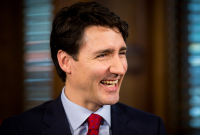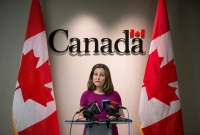Canada’s diplomatic corps has teamed up with the government's top statisticians to rapidly deploy facts across the border that can counter all of the false statements about trade, spewed out by U.S. President Donald Trump.
The apparent "rapid response" partnership between Canadian data geeks and diplomats was hatched by the federal Foreign Affairs Department along with the federal government's statistical agency, according to an internal briefing note obtained by National Observer.
Trump has repeatedly referred to a trade “deficit” with Canada — a false claim that the U.S. is importing a greater value of products than what it is exporting — even though his own White House economic council disagrees with him. Canadian officials also told CBC News last month that Trump’s NAFTA negotiator, U.S. Trade Representative Robert Lighthizer, was inflating his own figures.
A Global Affairs Canada departmental briefing note written last spring, itself issued in the wake of one of Trump’s countless trade tirades, outlined how the department was engaging with Statistics Canada on a “project” to address this headache.
"Statistics Canada and Global Affairs Canada are working jointly on a Canada-U.S. data project, with the aim of making Canada-U.S. statistical data readily accessible to officials in various departments and teams," reads the May 10, 2017 briefing note, released through freedom of information legislation.
The briefing note said the project would produce a “dashboard” with data on Canada-U.S. investment, trade and tourism that would be launched in June 2017. It said GAC had consulted with other government departments on the project.
The data agency also offered to support GAC’s U.S. task force and its chief economist, the document continued, “by having an 'on call' statistician should rapid response be required regarding Canada-U.S. data points for government products."
“GAC sees this as a long-term partnership and officials are developing a governance structure with Statistics Canada,” reads the note.
A spokesman said that the plan for the on call statistician never materialized, although the data agency remains ready to provide one if necessary.
Renegotiations over the North American Free Trade Agreement (NAFTA) are now entering a hurried phase, with Trump refusing to stop railing against “unfair” trade rules and hinting his administration’s exclusion of Canada from steel and aluminum tariffs hinge on the outcome of the talks.

On July 7, 2017, Statistics Canada published a new product, the “Canada and the World Statistics Hub.” Its first release, focused on the Canada-U.S. relationship, appeared in a similar way as the GAC-Statscan project is described, with a dashboard-style presentation of facts on “trade,” “investment,” “employment” and “travel.”
Statistics Canada spokesman Guillaume Bérubé said the project described in the briefing note was “a little larger” than the hub.
“Over the last number of years Statistics Canada has been working to increase the detail of our international account and trade statistics as well as try to find ways to make the data more accessible,” he wrote in an email.
The hub is “a first step” in that effort, he said, but there are other products, such as more detail on provincial trade with U.S. destinations, or examining the diversity of imports and exports by country.
“There is an increased demand for our Canada-U.S. data but our users (including government officials) do not know where to look to find the data and when they do find it, it is often difficult to understand,” he said. The agency is working on other hubs for U.K, Japan, Mexico and China.
He said the agency did offer an “on call statistician” as a “full-time resource” but it hasn’t been needed yet.
“We have been able to respond to GAC requests in a timely manner through our existing client service channels,” he said. “If we are unable to respond in a timely manner in the future we will consider dedicating staff or increasing staff to work with GAC to ensure they can find the data they are looking for.”
The briefing note referred to a “rapid response” because the data agency anticipated requests for Canada-U.S. data would jump as trade talks were launched — especially for things like tariff rates.
“We expected that we would receive a lot of detailed questions such as tariff rates on specific products, provincial-state trade flows, questions related to re-exports and transit goods – all of which require work related to data retrieval and explanation,” said Bérubé.
In response to questions about funding, Bérubé said the project is part of the data agency’s “base budget” and was made possible after the agency “re-prioritized” its work over the last year in anticipation of greater demand for Canada-U.S. facts. He said the agency didn’t receive funding from the foreign affairs department for the project.






Comments
Countering bluster and lies with facts sounds like a noble endeavour, however lamentable that it must be so.
Could Trump be snookered by agreeing to tariffs based on what he thinks trade balances are, and then insisting on implementation based on actual trade facts? :-}
Sounds like a good idea. I might only add that I hope there is a plan to make the most egregious distortions public. NAFTA isn't universally loved in Canada...and many of us have no stomach for accepting a bad deal, because the POTUS prefers his daft economic conclusions to reality.
We've been hearing a lot of yap about having a 0 tolerance for bullying in our schools, workplaces and places of government. Talk is cheap. Standing up to a bully much more satisfying...and in the long run, productive.
Thanks for pointing readers to this excellent tool on the Statistics Canada web site. It combines snappiness with rigour -- not easy to do. (http://www.statcan.gc.ca/pub/13-609-x/13-609-x2017001-eng.htm)
The only enhancement I can think of would be to show the thickness of the arrows proportional to the quantities.